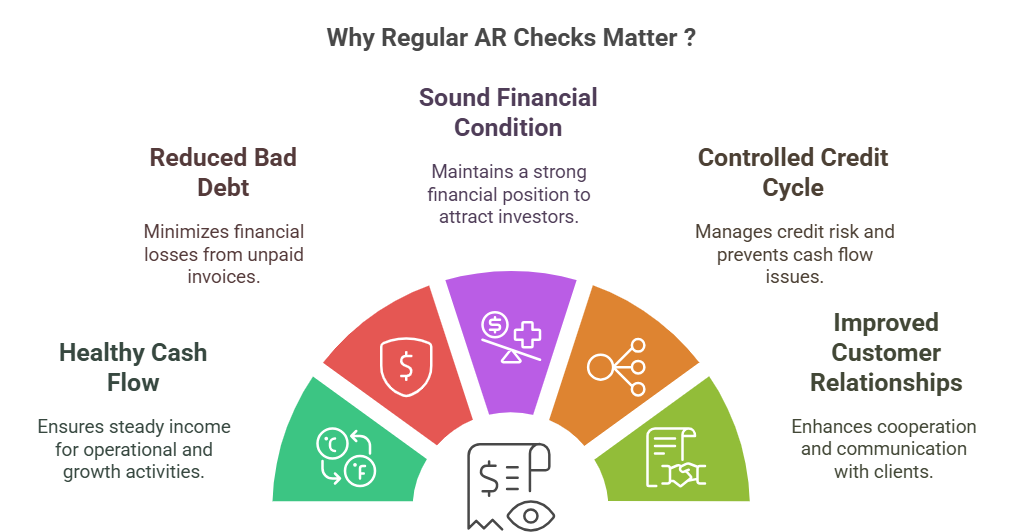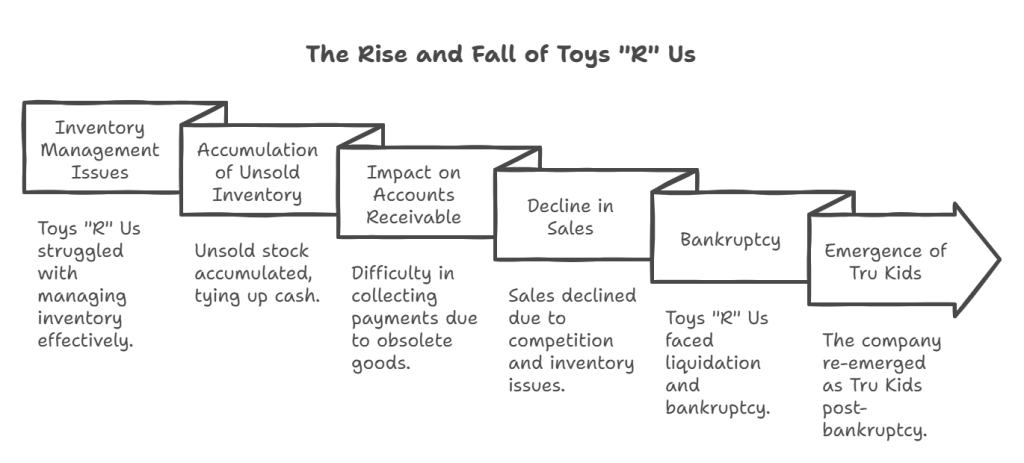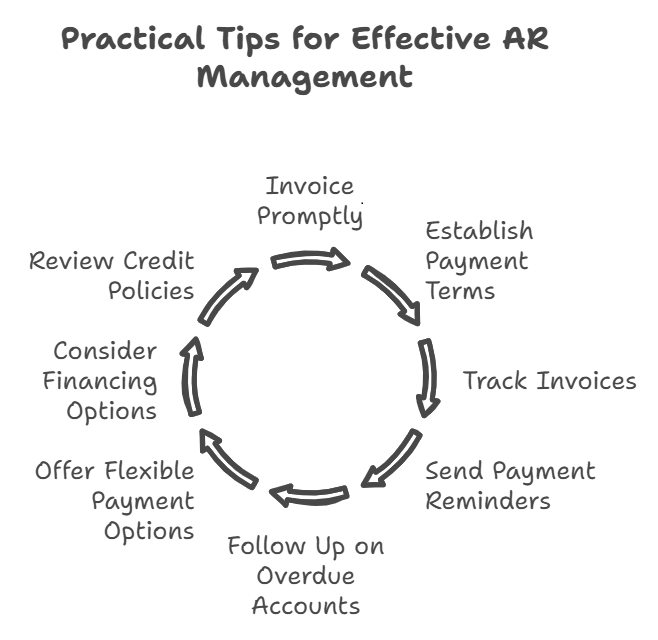
Pic Credit - Unsplash
Cash flow is the lifeblood that keeps things running smoothly and spurs expansion in the competitive world of business. Securing sales is a great accomplishment, but turning those purchases into real money is what really makes a difference. Accounts Receivable (AR) is the main focus here. AR is the sum of money that clients owe your company for products or services that have already been rendered. Not only is it a best practice, but managing AR well is essential to survival and success. Ignoring it can lead to a cascade of issues, from slowed growth to complete company collapse.
This blog post will examine the vital significance of routine AR checks, highlighting their main advantages and using a real-world case study to highlight the terrible results of neglect.
Why Regular AR Checks Matter ?
Consider your company to be a complex organism. Cash flow is the blood that transports those nutrients to each and every cell, whereas sales are the nutrients it consumes. In this comparison, AR stands for the circulatory system. The entire organism is negatively impacted if it is congested or ineffective.
Regular AR checks are essential for a thriving firm for the following reasons:

1 . Healthy Cash Flow: Cash flow that is steady and predictable is essential to every organization. Payments are made on schedule when AR is properly managed, guaranteeing a consistent flow of income. This gives you the ability to cover operating costs, make expansion investments, and take advantage of new opportunities. On the other hand, a growing AR balance indicates that clients are delaying payments, which puts a heavy burden on your cash flow. This can make it harder to pay suppliers, pay staff, and even cover basic expenses, which could endanger the stability of your company.
2. Reduced Bad Debt: Simply put, unpaid invoices are a loss of money. You can detect any problematic debts early on with the use of routine AR checks. You may frequently recoup what is due by aggressively following up on past-due payments. Additionally, early detection enables you to collaborate with clients to come up with mutually acceptable payment plans, possibly preventing total write-offs. On the other hand, ignoring AR raises the possibility that bills may become uncollectible, which will have a direct effect on your profitability and bottom line.
3. Sound Financial Condition: A strong financial position is influenced by a moderate amount of bad debt and a steady cash flow. This is crucial for drawing in investors, getting financing, and creating a long-lasting company. A business that manages its AR well is seen as more creditworthy and less hazardous. On the other hand, a company that has a history of bad debt and a high AR balance may find it difficult to get funding and be perceived as having unstable finances.
4. Controlled Credit Cycle: Giving consumers credit increases risk even though it’s frequently a vital part of increasing sales. You can better manage your credit cycle by conducting routine AR checks. By keeping an eye on payment trends, you can spot clients who frequently miss payments and modify credit terms appropriately. By doing this, the credit cycle is kept from getting out of hand, which could result in serious cash flow issues or even company failure. You can maximize your financial health by striking a balance between the requirement for timely payments and sales through a managed credit cycle.
5. Improved Customer Relationships: Proactively communicating about unpaid invoices may seem paradoxical, but it can really improve client relations. You may show that you appreciate on-time payments and provide chances for candid dialogue and problem-solving by handling payment concerns in a timely and professional manner. Stronger, more cooperative connections with your clients may result from this. Conversely, disregarding AR can result in strained relationships and even lost business because of miscommunications and animosity.
Case Study: “Toys “R” Us” (A Cautionary Tale)
Although there were many reasons for Toys “R” Us’s demise, their difficulties with inventory control and, consequently, accounts receivable, played a big role. They were unable to effectively manage their enormous inventory and saw a decline in sales as a result of growing competition from big-box stores and internet behemoths. As a result, there was an accumulation of unsold inventory, which tied up a large amount of cash and caused a huge problem with accounts receivable. They struggled to sell their obsolete goods and were sluggish to adjust to shifting consumer tastes, which affected their capacity to collect payments and keep a stable cash flow. In the end, this contributed to their liquidation and bankruptcy.
Even though it’s not just an AR problem, it shows how a company can be destroyed by not concentrating on effective procedures like inventories and collections. There are several stories about Toys “R” Us’ bankruptcy, such as this one from CNBC that discusses the intricacies of their financial predicament.
In November 2018, the grocery store chain Kroger announced that it would set up toy displays under the Geoffrey’s Toy Box brand in a few locations to provide a range of Toys “R” Us private-label products. Geoffrey LLC, a holding company for Toys “R” Us intellectual property, is in charge of managing the brand. On January 20, 2019, the business emerged from bankruptcy as Tru Kids. On October 8, 2019, the company rebuilt the items “R” Us website, focusing on tools and videos that highlighted well-liked items. The brand management company WHP Global announced on March 15, 2021, that it had acquired a controlling position in Tru Kids, the parent company of the Toys R Us, Babies R Us, and Geoffrey the Giraffe brands. WHP declared their plan to open 24 new physical locations in the US on September 29, 2023.

Key Takeaways from the Toys “R” Us Case:
- Inefficient inventory management can significantly impact accounts receivable. Unsold inventory ties up cash and makes it difficult to collect payments.
- Failing to adapt to changing market conditions can lead to declining sales and increased AR. Keeping up with consumer preferences is crucial for maintaining healthy revenue streams.
- A complex web of financial issues can contribute to business failure. While AR management is crucial, it’s just one piece of the puzzle.
Practical Tips for Effective AR Management:

- Invoice promptly and accurately: Send invoices as soon as goods or services are delivered. Ensure that all invoice details are correct to avoid delays in payment.
- Establish clear payment terms: Clearly communicate your payment terms to customers upfront. This includes the due date, accepted payment methods, and any late payment penalties.
- Track invoices diligently: Use accounting software or a spreadsheet to track all outstanding invoices. Regularly review your AR aging report to identify overdue accounts.
- Send payment reminders: Automate payment reminders to be sent a few days before the due date and again if the invoice becomes overdue.
- Follow up on overdue accounts: Don’t hesitate to contact customers with overdue accounts. Be polite but firm in your communication.
- Offer flexible payment options: Providing customers with multiple payment options can make it easier for them to pay on time.
- Consider factoring or invoice financing: If you’re experiencing cash flow problems due to slow-paying customers, consider factoring or invoice financing to access funds quickly.
- Regularly review your credit policies: Periodically review your credit policies to ensure they are still appropriate for your business and the current economic climate.
Frequent AR checks are an essential part of good financial management, not just an administrative task. You may maintain a solid financial position, reduce bad debt, guarantee a stable cash flow, and create a long-lasting company by giving AR management first priority. Keep your AR from turning into a ticking time bomb. Take charge of your money and prioritize doing routine AR checks. It is essential to the survival and expansion of your company.




More Blogs
Navigating Startup Failures !
Managing cash flow for startups
Startup & Maintaining Morale: Navigating the Rollercoaster of Growth